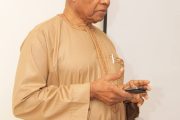The debate on restructuring Nigeria might be getting more complicated as the radical community of activists enter the arena, saying that the search for the truth about Nigeria is not the monopoly of the power elite. The Joint Action Front (JAF) acting as the vanguard of the common people is inviting sundry expressions of commoners to a dialogue session at the Lagos office of the Nigeria Labour Congress, (NLC) Monday.
Explaining its non-opposition to dialogue or National Conference, JAF, however, restates its earlier position that majority of those calling for restructuring at the moment are members and fronts of the ruling class who just want to negotiate the terms of sharing privileges and national wealth among themselves while keeping majority of the people impoverished. In other words, theirs is the restructuring debate of the urban poor, students, youths, middle class professionals, artisans, traders, farmers, the unemployed, intellectual workers in the media, universities and NGOs, among others.
The last time that constituency asserted itself was January 2012 when the Goodluck Jonathan announced one of the numerous fuel price increases. That also remains the only time in recent history that radical protest was nationwide. The radical intervention to de-annul the June 12 election results failed to attain that, becoming a source of reservations that eventually structured the implosion of the left. Why the January 2012 protest succeeded nationwide is something that has yet to be seriously investigated beyond lazy government analogy that some people engineered it.
This is though not a protest action, it nevertheless shares paternity with the overarching historical efforts of alternative ideological imagination to mobilise the masses to overcome ethno-religious manipulation and build a modern, fairer and just society. It is at pains to explain why Nigeria should still be what Prof Akin Mabogunje calls it – a society trying to emerge from being a collection of kinsmen and/or subjects of some potentates to becoming citizens of a liberal and modernizing nation-state – after 57 years of Independence. Subsequently, radicals call Nigeria’s independence mere flag independence. In obvious awareness of this position, some enlightened members of the ruling class or those JAF would call the members of the ruling cabal such as Dr Bukola Saraki are already saying that Nigeria has achieved a lot and independence has not been a waste. Some people would call that defensive radicalism on Dr Saraki part. The question is whether he can be classified together with former President, Olusegun Obasanjo, the voice of powerful currents in the Nigerian establishment who has said it again and again that youth unemployment is a ticking time bomb, an indirect reference to how poverty through joblessness swells the radical ferment.
Whether the radical ferment can still successfully reframe the national question from ethno-religious to the class narrative of exclusion and poverty at a time of deep identity divisions is what many observers are watching out for in Nigerian politics now. It could be the easiest thing to do just as it be the most difficult. If the radicalising impact of mass poverty helps radical activists to get the message and promise of national liberation across very powerfully, restructuring Nigeria along poverty eradication could just be a day’s job.




























